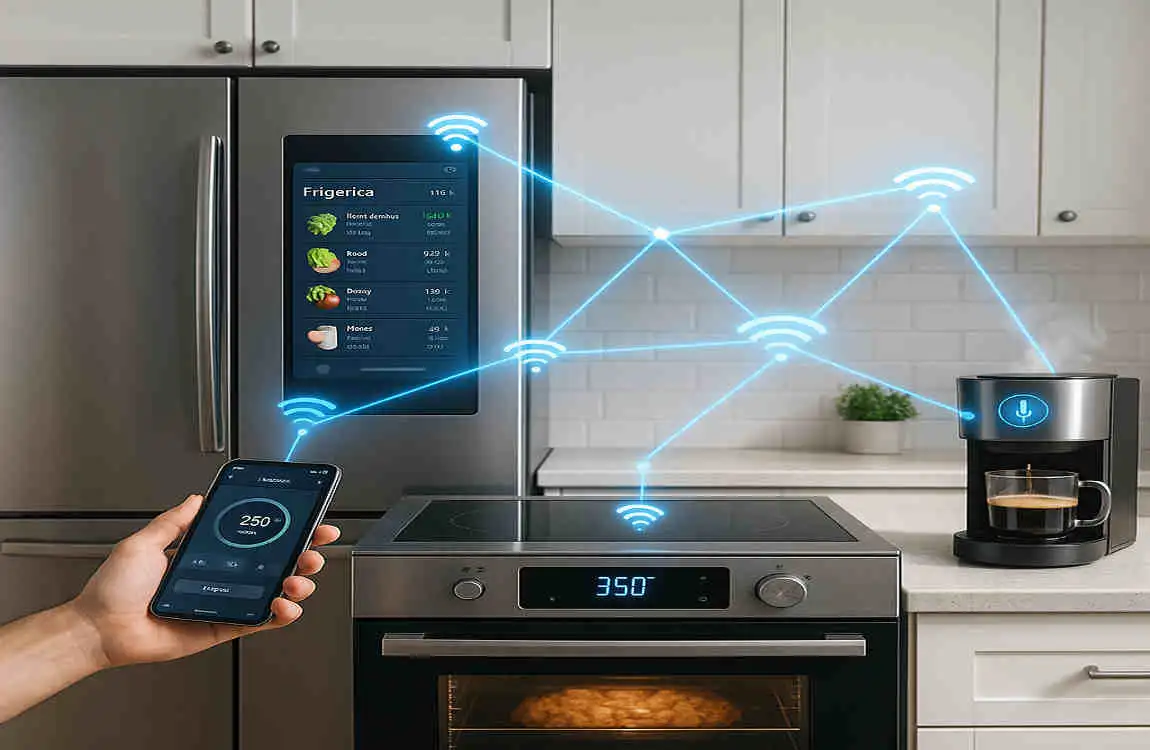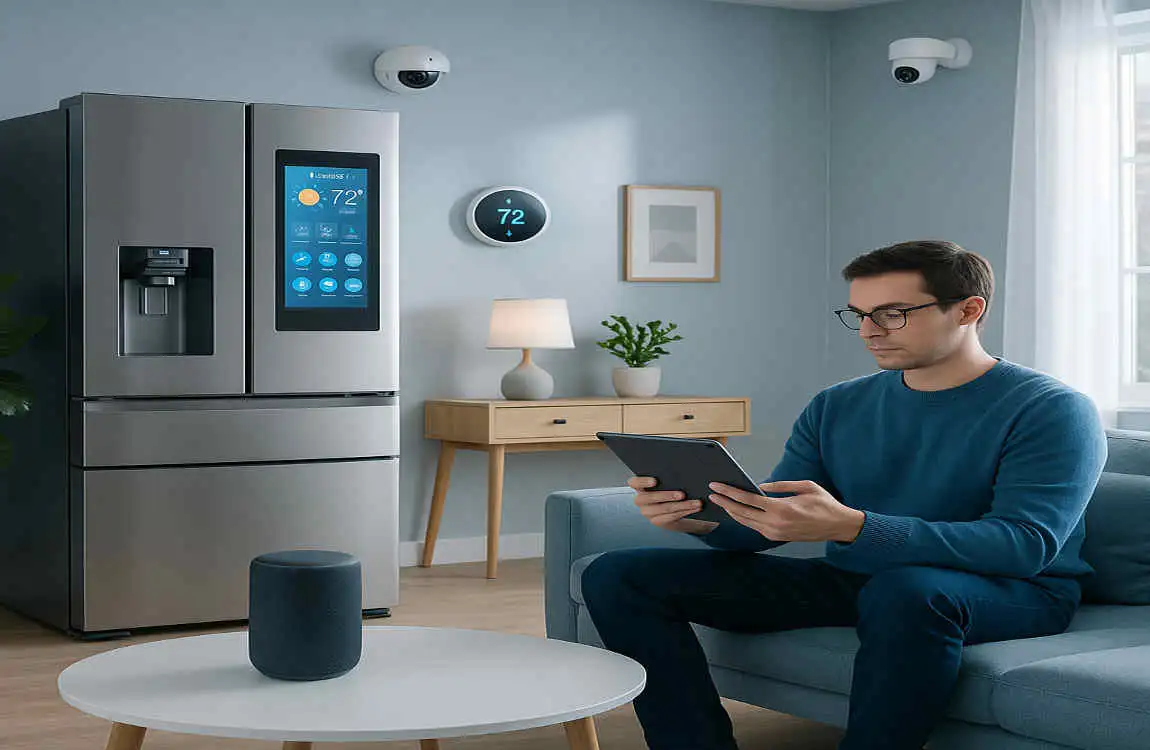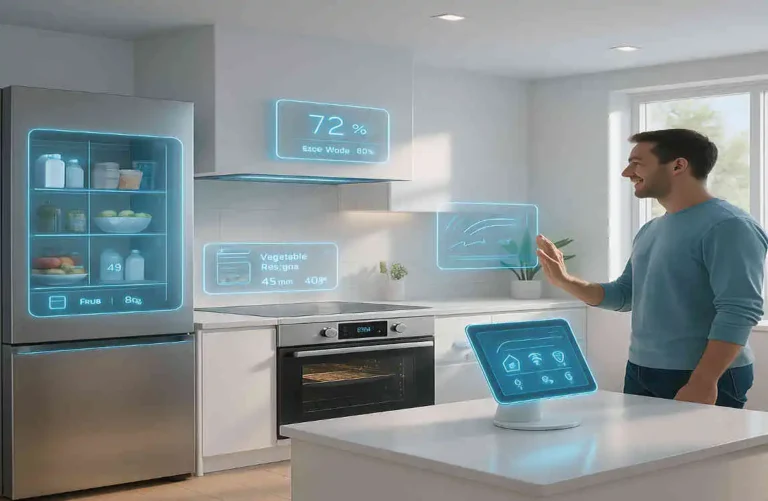Imagine walking into your home after a long day at work, and everything is just how you like it. The lights are set to your preferred ambiance, the temperature is perfect, and your favorite meal is cooking in the oven. This isn’t a scene from a sci-fi movie; it’s the reality of modern living with smart home appliances.
Smart home appliances are changing the way we live, work, and play. These devices use artificial intelligence (AI) to make our lives easier, more convenient, and more efficient. From refrigerators that track your groceries to thermostats that learn your temperature preferences, smart home appliances are revolutionizing how we interact with our homes.
What Makes a Home Appliance “Smart”?

So, what exactly makes a home appliance “smart”? At its core, a smart appliance leverages AI and the Internet of Things (IoT) to enhance functionality and deliver a better user experience.
AI Technology and IoT
AI technology allows smart appliances to learn from your behavior and preferences, adapting to your needs over time. IoT, on the other hand, enables these devices to connect to the internet and communicate with other smart devices in your home.
Features of Smart Appliances
Some standard features of smart appliances include:
- Automation: Smart appliances can perform tasks automatically, such as starting a load of laundry or adjusting the temperature based on your preferences.
- Connectivity: These devices can connect to your smartphone or other smart devices, allowing you to control them remotely.
- Learning Capabilities: Smart appliances can learn from your behavior and adjust their settings accordingly, making your life easier and more convenient.
Benefits of Smart Appliances
The benefits of smart appliances are numerous. They offer unparalleled convenience, allowing you to control your home from anywhere in the world. They also provide valuable data-driven insights, helping you make informed decisions about your energy usage and other aspects of your home.
Energy Efficiency and Sustainability in Smart Home Appliances
One of the most significant benefits of smart home appliances is their potential to save energy and reduce your carbon footprint. AI technology plays a crucial role in this, enabling these devices to optimize their energy usage based on your needs and preferences.
How AI Contributes to Energy Efficiency
AI can help smart appliances reduce energy consumption in several ways. For example, some devices use adaptive energy use, adjusting their power consumption based on your usage patterns. Others have standby power management features that minimize energy use when the device is not in use.
Energy-Saving Features in Smart Appliances
Some examples of energy-saving features in smart appliances include:
- Adaptive Energy Use: Smart appliances can adjust their energy usage based on your needs and preferences, reducing waste and saving you money on your electricity bills.
- Standby Power Management: These devices can minimize energy usage when not in use, further reducing your carbon footprint.
Environmental Benefits and Cost Savings
By reducing energy consumption, smart appliances can help you save money on your electricity bills while also reducing your environmental impact. In fact, some studies have shown that smart appliances can save up to 30% on energy costs compared to traditional appliances.
Role in Meeting Global Sustainability Goals
Smart appliances also play a crucial role in meeting global sustainability goals and green building standards. By reducing energy consumption and minimizing waste, these devices can help us create a more sustainable future for ourselves and future generations.
Top AI-Powered Smart Home Appliances Transforming Modern Living in 2025
Now that we’ve explored the benefits of smart home appliances, let’s take a closer look at some of the top AI-powered devices transforming modern living in 2025.
Smart Refrigerators
Smart refrigerators are one of the most popular smart home appliances on the market today. These devices use AI to keep track of your groceries, alerting you when items are about to expire and suggesting recipes based on what you have on hand.
Features of Smart Refrigerators
Some of the key features of smart refrigerators include:
- Inventory Management: Smart refrigerators can track your groceries and alert you when items are running low or about to expire.
- Expiry Alerts: These devices can send you notifications when items in your fridge are about to expire, helping you reduce food waste.
- Energy-Efficient Cooling: Smart refrigerators use AI to optimize cooling, reducing energy consumption and saving you money on your electricity bills.
AI-Enabled Climate Control
One of the most innovative features of smart refrigerators is their AI-enabled climate control. These devices can adjust their cooling systems based on the contents of your fridge, keeping your food fresher for longer while minimizing energy waste.
Smart Washing Machines and Dryers
Intelligent washing machines and dryers are another popular category of smart home appliances. These devices use AI to optimize their washing and drying cycles, reducing energy and water usage while still delivering excellent results.
Adaptive Wash Cycles
One of the key features of innovative washing machines is their adaptive wash cycles. These devices can detect the size and type of your load and adjust their washing and drying cycles accordingly. This not only saves energy and water but also helps extend the life of your clothes.
Energy and Water Usage Optimization
Intelligent washing machines and dryers also use AI to optimize their energy and water usage. These devices can detect when your load is clean, automatically shutting off to save energy and water. Some models even have features that let you monitor your usage and set goals to reduce your consumption.
AI-Powered Thermostats and HVAC Systems
AI-powered thermostats and HVAC systems are another popular category of smart home appliances. These devices use AI to learn your temperature preferences, adjusting their settings accordingly to maximize comfort and efficiency.
Learning Household Temperature Preferences
One of the key features of AI-powered thermostats and HVAC systems is their ability to learn your household’s temperature preferences. These devices can monitor your behavior and adjust their settings accordingly, keeping your home at the perfect temperature.
Remote Monitoring and Control
Another benefit of AI-powered thermostats and HVAC systems is their ability to be monitored and controlled remotely. These devices can connect to your smartphone, allowing you to adjust their settings from anywhere in the world. This not only saves energy but also gives you peace of mind knowing that your home is always at the perfect temperature.
Smart Lighting Systems
Intelligent lighting systems are another popular category of smart home appliances. These devices use AI to adjust their lighting schedules and brightness based on your needs and preferences, saving energy and creating the perfect ambiance in your home.
AI-Driven Lighting Schedules
One key feature of intelligent lighting systems is their AI-driven lighting schedules. These devices can learn your daily routine, adjusting their lighting accordingly to save energy and create the perfect ambiance in your home.
Integration with Other Smart Home Devices
Intelligent lighting systems can also be integrated with other smart home devices, further enhancing their energy-saving potential. For example, some systems can automatically turn off lights when you leave a room or adjust their brightness based on the time of day.
Smart Ovens and Kitchen Appliances
Smart ovens and kitchen appliances are another popular category of smart home appliances. These devices use AI to provide precise cooking controls, energy monitoring, and recipe integration, making it easier than ever to prepare delicious, healthy meals at home.
Recipe Integration and Precise Cooking Controls
One of the key features of smart ovens and kitchen appliances is their ability to integrate with recipes and provide precise cooking controls. These devices can automatically adjust their settings based on the recipe you’re following, ensuring that your meals are always cooked to perfection.
Energy Monitoring and Healthier Meal Preparation
Smart ovens and kitchen appliances also use AI to monitor their energy usage and provide guidance for healthier meal preparation. These devices can suggest recipes based on your dietary needs and preferences, helping you make healthier choices and reduce food waste.
Robot Vacuum Cleaners and Lawn Mowers
Robot vacuum cleaners and lawn mowers are another popular category of smart home appliances. These devices use AI to create autonomous cleaning schedules based on your home’s layout and dirt level, saving you time and effort while keeping your home clean and tidy.
Autonomous Cleaning Schedules
One of the key features of robot vacuum cleaners and lawn mowers is their ability to create autonomous cleaning schedules. These devices can learn your home’s layout and dirt level, adjusting their cleaning schedules accordingly to keep your home clean and tidy.
Energy-Efficient Operation Modes
Robot vacuum cleaners and lawn mowers also use AI to optimize their energy usage. These devices can detect when your floors or lawn are clean, automatically shutting off to save energy. Some models even have features that let you monitor your usage and set goals to reduce your consumption.
Smart Security Systems and Smart Locks
Intelligent security systems and smart locks are another popular category of smart home appliances. These devices use AI to provide advanced security features, such as facial recognition and anomaly detection, while also saving energy and integrating with other smart home devices.
AI-Based Facial Recognition and Anomaly Detection
One of the key features of intelligent security systems and smart locks is their ability to use AI for facial recognition and anomaly detection. These devices can learn to recognize your face and your family members’ faces, automatically unlocking when you approach. They can also detect unusual activity, alerting you to potential security threats.
Energy-Saving Sensors and Integration
Intelligent security systems and smart locks also use AI to save energy and integrate with other smart home devices. These devices can detect whether you’re home or away and automatically adjust their settings to save energy. They can also be integrated with other smart home devices, such as lights and thermostats, to create a more seamless and energy-efficient home.
How to Choose the Best Smart Home Appliances for Your Needs

With so many smart home appliances on the market, choosing the best ones for your needs can be challenging. Here are some factors to consider when making your decision:
- Compatibility: Make sure the smart appliances you choose are compatible with your existing smart home ecosystem.
- Energy Efficiency Ratings: Look for appliances with high energy efficiency ratings to save money on your electricity bills and reduce your carbon footprint.
- AI Capabilities: Consider the AI capabilities of the appliances you’re interested in, such as learning capabilities and data-driven insights.
- Budget: Set a budget for your smart home appliances and stick to it, considering the long-term savings on energy costs.
Future Trends in Smart Home Appliances and AI
As AI technology continues to evolve, we can expect to see even more advanced smart home appliances in the future. Some of the trends to watch for include:
- Advancements in Appliance Intelligence: AI will continue to become more sophisticated, enabling smart appliances to provide even more personalized and intuitive experiences.
- Expansion of Energy-Saving Technologies: Smart appliances will continue to become more energy-efficient, with new technologies and features designed to reduce waste and lower electricity bills.
- Increased Focus on Privacy and Data Security: As smart home appliances become more connected and data-driven, there will be an increased focus on privacy and data security, with new features and standards designed to protect your information.

